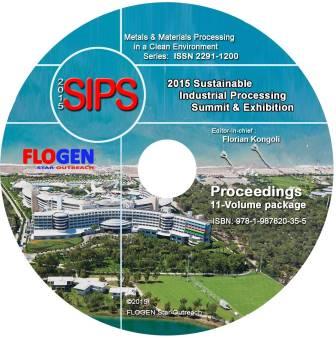2015-Sustainable Industrial Processing Summit
SIPS 2015 Volume 11: Recycling & Environmental
| Editors: | Kongoli F, Havlik T, Pagnanelli F |
| Publisher: | Flogen Star OUTREACH |
| Publication Year: | 2015 |
| Pages: | 410 pages |
| ISBN: | 978-1-987820-34-8 |
| ISSN: | 2291-1227 (Metals and Materials Processing in a Clean Environment Series) |

< CD shopping page
Tin Coatings - Minimizing Corrosion for Food Industry, Maximizing Corrosion for Recycling
Maros Halama1;1TECHNICAL UNIVERSITY OF KOSICE, FACULTY OF METALLURGY, CORROSION CONTROL LAB, Kosice, Slovakia (Slovak Republic);
Type of Paper: Regular
Id Paper: 64
Topic: 7
Abstract:
Nowadays, tinplates belong among the most important food packing material used e.g. for production of cans. Tin cans are used widely to store and keep safely juices, drinks and liquid products of different taste. Especially in food industry, one has to consider the effects of pH, acid content, presence of corrosion accelerators, oxygen etc. inside can. Thus, some of the liquids can be very aggressive to the metals and their surface treatment. The consequence is failures of cans due to the dissolution of high level of tin and iron. This paper deals with investigation of "run-off" effect of Sn into solution via monitoring of the impedance data retrieved by EIS. We have observed that release of Sn is not only time but also temperature dependent. The equivalent circuit models for tin under various pH, conductivity and TDS conditions were built. Here, minimizing corrosion process is sufficient, so "run-off" effect of Sn from cans into drink during short-term storage were calculated and compared to WHO legislative.
On the other hand, maximizing corrosion process during tin recycling from waste is of interest. Only little research is focused on tin as waste material coming from food industry and from electrical parts. Our group has measured maximum corrosion rate of Sn under special pH/conductivity/TDS conditions supported by coulometric stripping technique which could serve as process for effective recycling. The rapid increase in prizes of Sn on stock market builds up conditions for development of new effective recycling processes for this metal. By electrochemical approach, we can optimize the recycling process with minimal current and maximum efficiency.